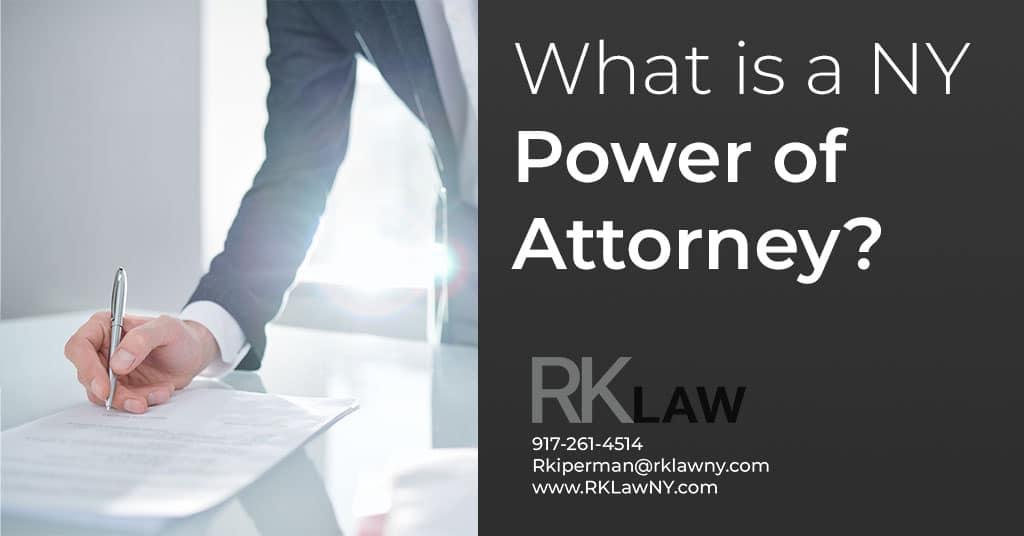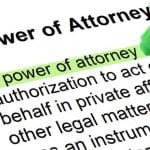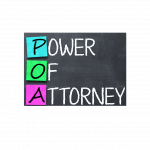What is a New York Power of Attorney?
A New York Power of Attorney is part of the Advance Directives packet.
A New York Power of Attorney is a document that allows you to designate one or more individuals to manage your financial transactions during your lifetime. The person who executes the New York Power of Attorney is known as the principal. The individual you designate is known as the agent or the attorney-in-fact. You may name one or more individuals to act as your primary agent and one or more individuals to act as your alternate agent. If you nominate more than one individual at a time, you can choose whether the individuals must act together or can act separately.
What can a New York Power of Attorney or (an Attorney-in-Fact) Do?
Your attorney-in-fact can do whatever you have specifically given them authority to do in your Power of Attorney. A Power of Attorney lists several powers you may grant to your agent, and you can choose to grant your agent any or all of the powers listed. Some of the powers you can grant to your agent include those regarding real estate transactions, banking transactions, business operating transactions, and estate transactions. For example, if you grant your agent the banking transactions power, your agent can deposit checks into and withdraw funds from your accounts.
There is also a section of your Power of Attorney that allows you to authorize your agent to make gifts in excess of $500. If you wish to grant your agent gift-giving powers, you must initial this section and complete a Statutory Gifts Rider. The Rider allows you to grant to your a variety of gift-giving powers, including the power to make gifts to himself, to make gifts to certain other individuals; or to open, modify, or terminate bank accounts held for the benefit of certain individuals. If you wish to grant any of the stated powers, you must write your initials next to such power.
What can a New York Power of Attorney not do?
An attorney-in-fact cannot do anything that you did not specifically authorize in your Power of Attorney. Along those lines, if you did not sign a Statutory Gifts Rider, your attorney-in-fact cannot make gifts in excess of $500 to anyone, including himself.
In addition, an attorney-in-fact has a duty to act in the best interests of the principal. They cannot engage in behavior that is purely for their own interests.
An attorney-in-fact cannot authorize someone else to act as the principal’s attorney-in-fact.
Is a Power of Attorney Responsible for Debt?
No. An attorney-in-fact is not responsible for the principal’s debt. This means that even if the principal is no longer able to pay his debts, the attorney-in-fact is not personally liable for those debts.
Is a Power of Attorney the Same Thing as Guardianship?
A Power of Attorney and guardianship are not the same, but there are a lot of similarities between the two.
The differences as follows:
A Power of Attorney is a document that someone can execute without court intervention. The principal of the Power of Attorney must have capacity to execute the Power of Attorney.
Powers of Attorney are limited to financial matters. (While there are Medical Powers of Attorney, these are separate documents and are usually known as Health Care Proxies in New York.) The powers that the principal grants are those that he initialed next to in the Power of Attorney. In New York, Powers of Attorney are governed under General Obligations Law 5-1501 through 1514.
Guardianship is a proceeding that is commenced in Supreme Court in order to appoint a guardian for an incapacitated adult (or an adult that has capacity but is otherwise in need of a guardian). A Guardian can be appointed for someone whether or not they are incapacitated. A Guardian of the Person makes decisions specifically about personal matters, while a Guardian of the Property makes decisions about the financial affairs of either an “Incapacitated Person” or a “Person in Need of a Guardian.”
The powers granted to the Guardian are set forth in the Order and Judgment, which is signed by the court. Guardianship matters are governed by Articles 81 and 83 of New York’s Mental Hygiene Law.
Notwithstanding the differences between the two, there are also a lot of similarities. Both an attorney-in-fact and a Guardian of the Property can be granted similar powers, including the power to write checks and pay bills of the principal/ incapacitated person; enter into contracts for the benefit of the principal/ incapacitated person; obtain and maintain government benefits for the principal/ incapacitated person; pay the principal’s/ incapacitated person’s taxes; and make gifts. Note that some of the guardianship powers, including the power to make gifts and enter into contracts, may require court approval before action can be taken.
In addition, both Guardians and attorneys-in-fact have a duty to act in the principal’s/ incapacitated person’s best interests.
Does Guardianship override the Power of Attorney?
Yes, sometimes. Where a Guardian of the Property is appointed, that appointment will override a Power of Attorney.
However where only a Guardian of the Person is appointed, that appointment will not override a Power of Attorney, since a Guardian of the Person can only make decisions about the Incapacitated Person’s personal matters, not his financial matters.
When does a Power of Attorney become effective?
You may wish for your Power of Attorney to become effective upon your incapacity or for it to become effective immediately upon execution and stay effective even if you lose capacity. A Power of Attorney that becomes effective upon incapacity is known as a Springing Power of Attorney. A Power of Attorney that stays effective once you lose capacity is known as a Durable Power of Attorney.
Make sure to discuss which type of Power of Attorney you want, so your attorney can provide you with the right form.
When is a Power of Attorney no longer effective?
A Power of Attorney can become ineffective upon the occurrence of one of the following:
A Power of Attorney is no longer effective upon the death of the principal.
Alternatively, the principal of the Power of Attorney can revoke the Power of Attorney during his lifetime.
In addition, as mentioned above, if a Guardian of the Property is appointed for the principal, the guardianship overrides the Power of Attorney.
Lastly, while they are no longer as common today as they once were, Powers of Attorney can be designed so that they become effective upon their execution but then terminate upon the incapacity of the principal.
Where do I get a New York Power of Attorney?
While you can find Power of Attorney forms online, or clicking here, it is best to seek the help of an attorney, who is more likely to have the most up-to-date statutory form and can advise on the issues of preparing a power of attorney and what powers should and should not be granted.
Note that Governor Cuomo has just enacted a change to the laws that makes substantial modifications to the Power of Attorney Statute. We are preparing another post that will describe all of the changes in greater detail.
For more information, please contact Guardianship, probate and estate planning attorney Regina Kiperman:
Phone: 917-261-4514
Email: rkiperman@rklawny.com
Or visit her at her office:
80 Maiden Lane
Suite 304
New York, NY 10038
This post is made available by the lawyer for educational purposes only as well as to give you general information and a general understanding of the law, not to provide specific legal advice. By using this site you understand that there is no attorney client relationship between you and the lawyer. The post should not be used as a substitute for competent legal advice from a licensed professional attorney in your state. ATTORNEY ADVERTISING.


